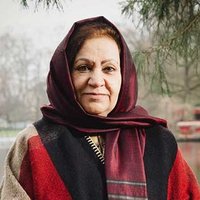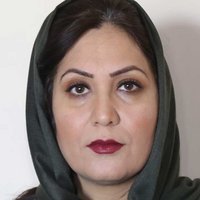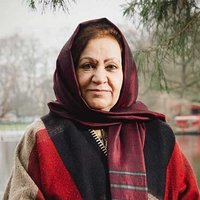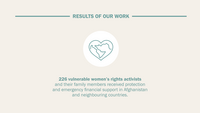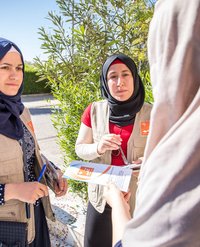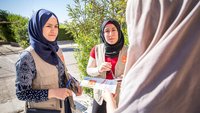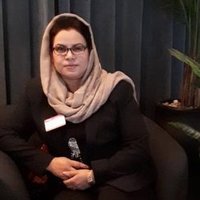Women’s rights in Afghanistan
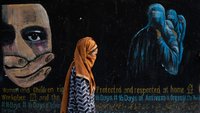
In Afghanistan, people have been suffering for decades from starvation, war and terror. However, the situation in the country deteriorated drastically in August 2021 as the Taliban took power. According to the World Food Programme (WFP), in 2023 two thirds of the population are dependent on humanitarian assistance – almost three times as many as in 2021. For women and girls. the situation is particularly dramatic. It took only a few months for the Islamists to act with incomparable severity towards women and girls as they took away their right to self-determination and wiped out 20 years of progress for the rights of women and girls in the country.
Taliban disregards women’s rights in Afghanistan
In spite of their initial promises to respect women’s rights within the framework of Sharia law, the Taliban issued numerous decrees that prevent women and girls from exercising their basic rights to freedom of expression, liberty, work and education. Afghans who do take to the streets to protest for their rights are being threatened, arrested and tortured. Women’s rights activists report there have been detentions, child marriages, forced marriages and rapes.
Lack of rights for women becomes state policy
In 1919, Afghan women were granted the right to vote. In 1920 the first school for girls opened its doors. In the 1970s, the Afghan government raised the marriage age for women from 18 to 21, abolished polygamy and introduced compulsory education.
However, after their victory against the Soviet Union at the end of the 1980s, the Mujahideen – and later the Taliban – put in place severe restrictions on the rights of women. After the intervention of NATO forces in 2001, activists managed to fight for and achieve significant legislative progress. Unfortunately, even before the Taliban took power in August 2021, many of these state-sanctioned rights had never actually been implemented in practice. Patriarchal structures, religious fundamentalism and corruption all prevented many laws from being upheld.
“For now, I wish for the women of my land to be empowered, patient and not disappointed, and I want them not to lose their spirit of struggle and righteousness. A little patience, dawn is near!”
Under the Taliban, this lack of rights for women then became government policy again: They were excluded from public life. Their access to civil rights and liberties was radically cut. For a woman or LGBTQI+ person before 2021 it was not at all easy to openly pursue their own independent life vision, but now it is impossible again. Women’s rights activists are facing serious threats. Nonetheless, Afghan women continue to fight for their rights and against the fundamentalism of the Taliban – even if they face severe reprisals.
medica mondiale: Focussing on the acute needs of women and girls
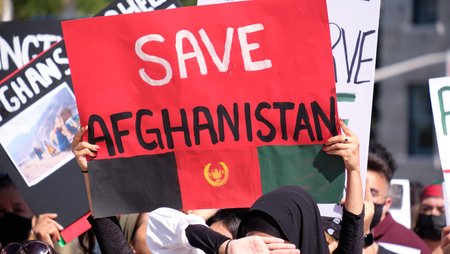
medica mondiale is helping the staff from its partner organisations and women’s rights defenders to find safe places to stay and to flee Afghanistan with their families. With our projects and local partner organisations we are focussing on acute needs such as security and psychosocial support for women and girls. In order to identify further opportunities to provide support, we are in dialogue with women’s rights activists within and outside the country.
Nine facts on women's rights in Afghanistan
1. Restriction of freedom of movement and restrictive dress codes
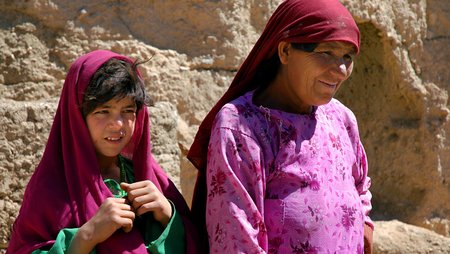
The Taliban issued a series of decrees and guidelines that violate the human rights of women and girls, including the right to freedom of movement. Women are not allowed to move around in public space unless they are in the company of a male relative classed as a mahram. In general, they are only allowed to leave their house for urgent matters and have to wear full veils if they do.
Women who flout the dress code put their male relatives at risk of imprisonment. Presenters on TV news programs have to wear a full veil during the broadcast.
2. No protection for women and girls threatened by violence
There are almost no contact points now for survivors of sexualised violence to turn to. The nationwide system of support built up by women’s rights activists in the previous 20 years has almost completed collapsed: Safe houses had to close. Staff of organisations offering protection and advice are subject to threats and often have to work undercover. Since 2009, 22 cases of maltreatment of women had been brought under the Law on the Elimination of Violence against Women (EVAW Law), but this no longer has any validity. The Ministry of Women’s Affairs has been abolished. As the Taliban swept through the country seizing power in 2021, they systematically released prisoners, many of whom had been imprisoned for committing acts of gender-based violence.
3. Forced and child marriage: Combatting poverty and the spoils of war
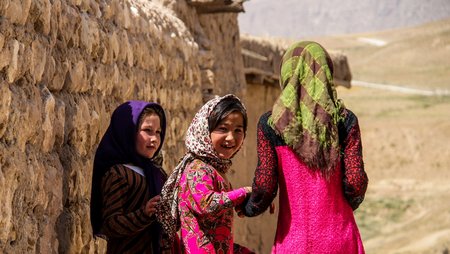
Even before the victory of the Taliban, one in three girls were being forced into marriage before their 18th birthday. This high number has continued to increase (as of 2023). The humanitarian crisis in the country is having a particularly severe impact on women, women-led households, and families with many children. In order to avoid starvation, ever more parents are marrying off their young daughters in return for a dowry.
Some families even marry off their daughters early as a form of protection: to avoid them later being forced to marry a Taliban fighter. The Islamists are repeatedly forcing families to give them their unmarried daughters as brides. Other families actually choose to marry off their daughter to a Talib in order to gain protection for the family. Although the Taliban issued a decree in December 2021 to prohibit forced marriages, this is not protecting the girls.
4. Girls and women are losing the right to an education
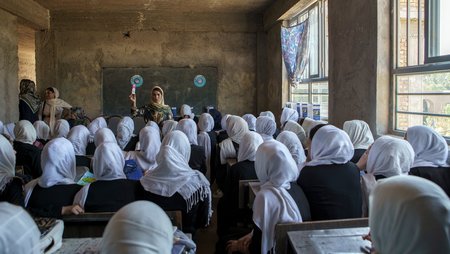
One of the first political acts of the Taliban was to forbid girls from attending secondary schools. And since December 2022, women are no longer allowed to study. There are some courses which continue via online teaching, but the female students are no longer permitted to take the examinations. Without education, girls face an even higher risk of being exploited, maltreated or married off early. Their chances of later studying or finding a good job then disappear.
Women’s rights activists are concerned at the number of Islamic schools being set up around the country. Since they have no other opportunity to learn, ever more girls and young women are attending these madrassas. The teachers in these schools teach them Islamist and radical ideas, which they then relay to other family members.
5. Women only have a few opportunities to work
Since the Taliban took power, professional opportunities for women have been severely restricted. Many women lost their jobs. Others are only allowed to continue if they work from home. Any women who do still have a job to go to have to be accompanied on their journey to work by a male (mahram). This loss of employment for women has pushed many families even deeper into poverty. Increasing numbers of Afghans are begging in the streets in order to survive.
Women working with humanitarian projects, which are urgently needed, have frequently also been hindered in their work or prevented from carrying it out. As of April 2023, Afghan women are no longer allowed to work for the UN. And the situation is similar in the education and healthcare sectors. For example, female doctors are not permitted to treat male patients or work together with their male colleagues. Since the seizure of power by the Taliban, 84 per cent of journalists stopped working because of the fear of repression. Those who do continue are placing their lives at risk. Female lawyers and judges have mostly been excluded from their work.
6. Women’s rights work within civil society under severe pressure
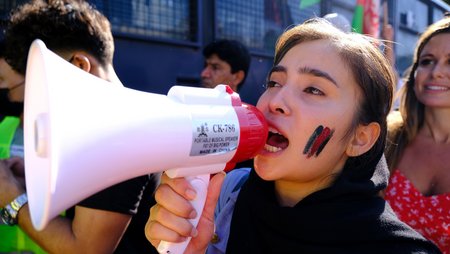
Since August 2021, Afghan women have repeatedly held demonstrations demanding education, work, justice and peace. They continue these protests in spite of the brutality of the regime, imprisonments and abductions. Civil society organisations and activists draw on their creativity and hope to continue their work for the rights of women and girls.
7. Not foreseen: Political participation by women
With the help of a quota regulation, before the Taliban regime took power, women formed 27 per cent of the Members of Parliament in Afghanistan. Across the country, 21 per cent of all defence counsel were women and 265 judges were female out of a total of 1951. Now there is not one single woman as minister in the new Afghan government. The Taliban has once again set up the infamous Ministry for the Propagation of Virtue and the Prevention of Vice which enforces the misogynist decrees of the regime. It is forbidden for women to participate in the judicial system – including female judges, prosecutors and lawyers.
8. High rates of infant and maternal mortality
Afghanistan has one of the highest rates of maternal mortality in the world. According to UN estimates, every two hours an Afghan woman dies during pregnancy or while giving birth. The causes of these deaths include young age, vitamin deficiency and poor medical care during the pregnancy: Considering this humanitarian crisis, the ban on the sale of contraception, introduced by the Taliban in 2023, can have fatal consequences for women.
9. Discrimination against the Hazara
The mainly Shiite Hazaras have been subjected to discrimination and racism for a long time, but this has increased since the Taliban seized power. Women and girls in particular are affected by multiple forms of discrimination and violence.
Many beatings and attacks have been deliberately targeted at women and girls of the Hazara ethnic minority. Activists are raising awareness of the ‘silent genocide’, and courageous Hazar women repeatedly hold demonstrations on the streets of various Afghan cities to protest against the injustice.
(Updated: 06/2023)
Facts & figures from our practical work
Please support this work by making a donation!
Partner organisations:
- Afghan Women's Peace and Freedom Organization
- Safety and Risk Mitigation Organization
- Women for Justice Organisation
Project priorities:
- Advocacy, public awareness work and prevention work for protection of women and girls
- Stress- and trauma-sensitive offers for survivors
- Networking for activists, feminist organisations and other networks
Funding and funders:
- Irene M. Staehelin Stiftung
- Own resources
Source: Annual Report 2022
© Dreimalig/medica mondiale
Focal points of work
medica mondiale has been working for 20 years in Afghanistan. The programme in the initial years led to the emergence of an the independent Afghan women’s organisation Medica Afghanistan. medica mondiale worked closely with them and provided advice and consultancy on specialist topics and issues of organisation. In spite of all the difficulties and resistance, the activists were able to assist women affected by violence and fight for societal change. Then their lives were put at risk when the Taliban seized power in 2021.
Although the situation for women's rights organisations in Afghanistan is life-threatening, courageous women are still standing up for their rights. medica mondiale, working closely with five partner organisations, managed to carry out eight projects in Afghanistan in 2022. The work has the following focal points:
1. Prevention violence against women
Although the Taliban have seized power, our partner organisations continue trying to find ways to support women affected by violence. For example, one of our local partner organisations succeeded in reducing the number of violent attacks within families by talking and discussing with community members about women's empowerment.
The German government has supported this project work with funding until 2021. medica mondiale continues to demand that the German government lives up to its political responsibility. This means providing more financial support to Afghan women's rights organisations and activists, involving them directly in political processes and decisions at the national level, and advocating for their voice and participation at the international level.
2. Solidarity and support for survivors
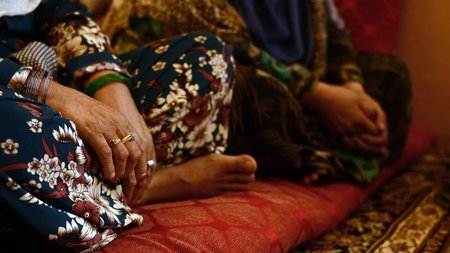
Psychosocial counselling program
medica mondiale worked closely with its partner organisations to develop the Stress- and Trauma-sensitive Approach (STA). Based on their practical and local experiences, medica mondiale provided frequent training in this approach for the counsellors in Afghanistan during the past 20 years. In 2022, our partners continued to work with women affected by violence in one-to-one or group psychosocial counselling. They strengthened them and worked through their experiences of violence together.
Socio-economic support
Together with another partner organisation, we offer socio-economic support to survivors who are affected by unemployment and poverty, among other things. Income-generating measures, the promotion of initiatives and reintegration into society are our priority.
Knowledge for legal aid
Women in Afghanistan are no longer allowed to work or go to university. The team of our partner organisation WJO – “Women for Justice” – has nevertheless found a way to train lawyers through an online programme. The aim is to provide future lawyers with knowledge on women’s rights and to show them how to use existing law to fight for justice for women.
3. Strenghtening feminist action
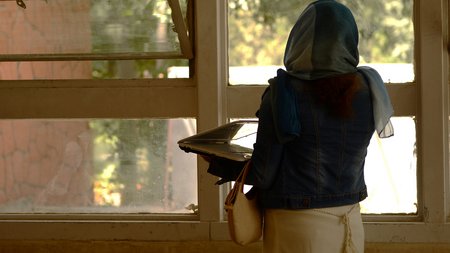
Protecting activists and human rights defenders
Together with our partner organisation Safety and Risk Mitigation Organization (SRMO) in Afghanistan, we are empowering the local civil society and offering protection and support for vulnerable human rights defenders.
Psychosocial counselling for activists
One partner organisation supports particularly vulnerable women together with medica mondiale. The target group includes human rights defenders, peace activists, civil society activists as well as journalists, defence lawyers, state prosecutors, teachers and university tutors.
The provision of psychosocial counselling is intended to help strengthen their psychological health and well-being. The need for this type of counselling has increased strongly since the Taliban seized power. medica mondiale is providing specialist advice to the partner organisation as they implement stress- and trauma-sensitive offers.
Support for women’s organisations during Taliban rule
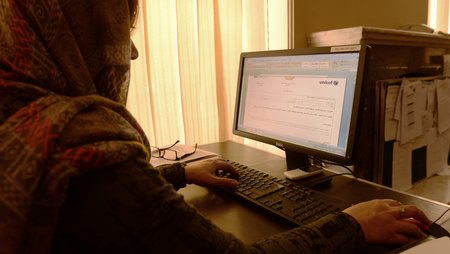
With the support for a project, medica mondiale is assisting a programme to stabilise Afghan women’s organisations. The aim here is to ensure they can continue their work safely under the present conditions. medica mondiale is making available the appropriate resources for strategic further development and for planning and implementation of offers of assistance for women and girls in Afghanistan. The resilience, viability, well-being and solidarity of Afghan women's rights activists and women-led organisations are thus strengthened and expanded.
(Status „Focal points of work“ of: 08/2023)
